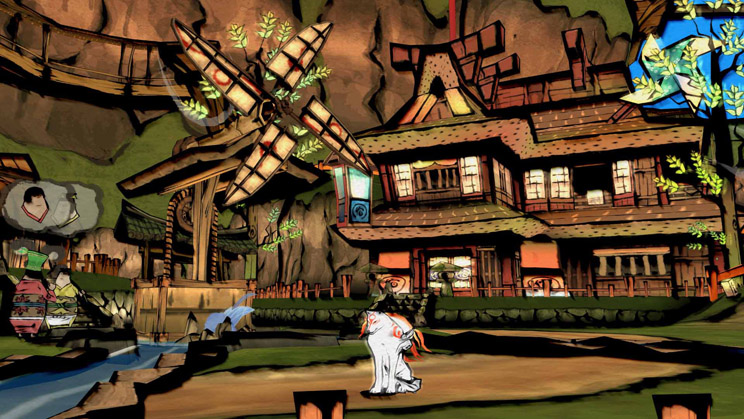As video games continue to grow as a medium, we’ve seen them stretched out into every possible direction. We’ve seen games built with the sole purpose of pulling out a few bucks from the wallets of Facebook users. Games presenting cinematic explosions and set pieces for thrills. Mass-multiplayer games breaching mainstream audiences and hardcore competitive gamers alike. Indie games have dived headlong into abstraction, artistic expression, and difficult real-life issues. And sometimes, a game is just there to entertain kids for a few hours. But as all of this is happening, one question continues to float around in conversations about games: “Are video games art?”
And I’m here today to tell you to shut the h*** up and stop asking that.
Clearly, we here at Artistry in Games believe video games have an artistic side. It’s the thesis statement of this entire site. Every one of us spends time burying ourselves in the thick of music, imagery, narrative, and expression through games. So, if the discussion of “Are video games art?” were to come up, it’d be pretty obvious what side we’d fall on in that debate.
However, I wouldn’t immediately leap to the defense of games being art quite so quickly, at least not in response to that particular question. The reason being that I think that question is doing more damage to the defense of games as art than it is good. It’s simply not the right question, and every time an argument is sparked based around that starting point, no progress or meaningful conversation is ever had. The two camps just bicker back and forth about what they personally want from games or see games as being.
“Are video games art?” is too black-and-white. It’s too “one or the other”. It implies that games are either all art, or no games are art. It’s too broad. Allow me to frame this point in terms of another artistic medium: painting.
If I were to paint a lush landscape, focusing on use of color to invoke emotion in those viewing it. Putting a representation of myself, my life, and my experience into every brush stroke. To tell a story of my past, of my homeland, and of things I have seen. You would say: this painting is art.
And if I were to take a paint roller of Robin’s Egg Blue Sherwin-Williams to the wall in my den, you’d probably go: you’re just painting your house. This isn’t an artistic expression. I’m not making a statement. I’m just putting a calming color in the room I want to sit in a lot. That’s it. I’m not using paint for any reason other than utility.
So, if we were to ask “Is painting art?”, it would clearly take into consideration the first example. I am, indeed, using painting as a form of artistic expression in that scenario. But the second use of painting? Not art.
The same can be applied to any artistic medium. Writing? Some books are written artistically, relying on poetics and word-play to tell epic stories. But writing can also be informative. Educational. Some writing can be technical. Some can be philosophical. And some writing can be cheap grocery-store romance cheese pumped out with no intention other than suckering in a few bucks from lonely middle-agers.
Movies? Sure, you can have artistically-minded movies. Projects that meticulously focus on framing the perfect shot, telling a sprawling narrative full of nuance and emotion. But you can also have a Michael Bay film, which primarily just wants to impress you with explosions and mindless action for a couple hours. Entertainment that doesn’t want to do anything besides give you amusement for an afternoon.

Video games are no different. For every Braid that wishes to present a point, tell a story, engross you with visuals and sound, there is a Call of Duty that primarily just wants to entertain. For every Limbo, layering on metaphor and abstraction, there is a Mario that just wants you to sit down and enjoy jumping on some baddies and picking your friends up and throwing them into a pit. For every Papers, Please, which digs into real-world paranoia and nationalism, presenting a bleak expression of very resonating concepts, there is a Street Fighter which is meant to provide competition. For every Minecraft, which seeks to give you a creative toy, a canvas to paint on, there is a Farmville that is mainly just there to eat up your time while you’re bored at the office.
These are all video games. But are they all “art”? Not really. They contain other types of art: Tetris has music. Peggle has quirky characters drawn up by a visual artist. But these games are not primarily focused on presenting themselves as artistic. And that kind of variety is very good. It’s necessary. It means the medium has reached the viability of other forms of expression.
So, back to the question: “Are video games art?”.
Asking a question that presents a duality is clearly pushing the conversation into a two-camp argument. For those that don’t want anything other than a quick thrill or a fun little distraction, they don’t care about if games are art. For those that have spent 25 years jumping and shooting, and would like a deeper experience, they want to legitimize the medium as art. The problem is: they’re both right. And because of that, the argument tends to be a personal-preference thing, and not an actual discussion on the merits of both sides of the medium.
People who don’t care about art in games feel as though games that focus on art are ignoring what they like in games: fun. You’ve seen this when a game like Proteus or 9.03m rolls around. “This isn’t even a game! Gameplay should come before story! Walking simulator!”. These are incorrect statements that undermine what the developers were attempting to achieve. But they make sense to the people who don’t believe video games should focus on art over fun. Because to them, a game is about gameplay and fun, not about storytelling and emotion. So a game that isn’t really presented as “fun” isn’t really a game to them.

And on the other side, it’s very hard to argue that Mario has much artistic merit these days. The games in that franchise rehash the same simply story. They present a lot of the same visuals and design. They’re not there to do anything other than entertain and create a fun experience without much thought necessary. There is little focus on how the game comes across as a form of expression these days. Nintendo in general focuses much more on presenting video games for the “games are about fun, not art” camp. And it can make their games very unappealing to people looking for a bit more than just another fun experience. They come across as a bit shallow and repetitive. Boring and uninspired. Still enjoyable, just not nearly as much as the medium could accomplish.
It’s good that both exist. Both of these design directions have their merits and their issues. With a massive gray area between the two, we can have games focus on both, one more than the other, or neither. Games can go in many other directions too. Educational, competitive, etc. But it all comes back to that question: “Are video games art?”. This question does not respect all the gray area, and all the different intentions a game could have.
Now that I’ve addressed the issue, allow me to remedy the situation. Let me tell you what the question should be.
“Do video games have the capacity for art?”
There. Now we’re not making broad generalizations. We’re honing in on what we REALLY want to discuss: can we use video games as a form of artistic expression if we want. The answer to that is “absolutely”. We’ve seen it many times before, and will continue to see it well into the future. That’s why this site exists, and it’s what we intend on looking at. As well as diving into the artistry behind games that aren’t entirely about artistic expression. Showcasing the gray area between “art game” and “fun game”. Running the gamut of all the ways a game can present itself, and all the different ideas and focuses a game maker can have when they head into a project.

Rewording this question to be less about one side or the other makes it easier for us to discuss it without feeling as though we’re alienating people that don’t seek that in their games. Even if the question in and of itself doesn’t mean to, it creates a divide in philosophies, instead of doing such a varied medium justice. It makes it hard to have the conversations we’d like to have about video games.
My intention here isn’t to change the question, but change the way it’s presented, so as to allow us to find what we come to desire from gaming. And to allow us to no longer dismiss a game under the thought that it is or isn’t a game due to our own projections of what a game should be. Movies can be many things. Books can be many things. And as such, video games can be many things.
And one of those things is art.

 …WOOLY DESERVES BETTER LOL!
…WOOLY DESERVES BETTER LOL!